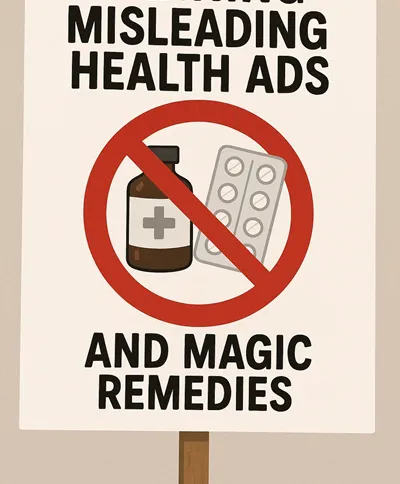
To prohibit false advertising of drugs or treatments claiming to cure grievous diseases or magic remedies, the Drugs and Magic Remedies (Objectionable Advertisements) Act, 1954 aims to safeguard the public against false, exaggerated or injurious health claims.
Main objectives:
- To offer protection from fraudulent advertisements and misrepresentation of drugs or therapies.
- To protect human lives from being misled into using unproven or possibly harmful therapies.
- Bans advertisements regarding magical cures, charms, spells, or talismans.
- Bans cures being advertised for diseases like cancer, diabetes, AIDS, and so on.
This piece of legislation validates the public about false or misleading health claims and controls the advertising of scientifically proven or registered treatments.
FAQs – Drugs and Magic Remedies (Objectionable Advertisements) Act, 1954
-
1. What is this Act about?
-
It is a law that bans misleading advertisements of drugs and magical treatments that claim to cure serious diseases or improve physical traits.
-
2. Why was this law made?
-
So that people are not taken in by false or fake health claims that concern serious conditions like cancer, diabetes, infertility, and so on.
-
3. What is a "magic remedy"?
-
Anything like a talisman, mantra, amulet, or spiritual treatment that claims to magically cure a health problem.
-
4. Are all advertisements for medicines banned?
-
No. Only those that make false, exaggerated, or otherwise prohibited claims are banned.
-
5. What advertisements are banned under this Act?
-
- Ads which claim to:
Cure diseases like cancer, AIDS, diabetes, etc.
Improve sexual strength or fertility
Change physical features like height or complexion
Use charms or mantras to heal
- Ads which claim to:
-
6. Does this law cover ads on television, newspapers, or the internet?
-
Yes. It covers all media, which include television, radio, newspapers, pamphlets, posters, and even online ads or social media.
-
7. Can someone advertise an ayurvedic or homoeopathic treatment for any serious disease?
-
No. All systems of medicine are covered. If an advertisement sounds false or promotes anything prohibited, it is going to be banned – no matter what system of medicine it is.
-
8. Can I report a misleading health advertisement if I see one?
-
Yes. You can lodge a complaint with the Drug Controller Office or the local health department.
-
9. What are the penalties for violating this law?
-
Yes. For individuals or companies publishing or promoting banned ads, there may be fines and jail terms.
-
10. Can a doctor, in fact, promote a product to cure a serious disease?
-
No. If a doctor says so, it is illegal because the claims have not been proved to be scientifically valid or were under the banned category.
-
11. What diseases are banned from publicity as being cured?
-
Diseases like cancer, diabetes, AIDS, epilepsy, asthma, blindness, sexual impotence, leprosy, etc. are encompassed in the law. Ads claiming to cure these are prohibited.
-
12. Can cosmetic products be advertised under this Act?
-
Only if they don't make false or magic health claims. For instance, advertising a cream as "magically removes all skin diseases" would be banned.
-
13. What should I check before trusting a medical ad?
-
- Ensure it:
Is okayed by health authorities.
Does not promise magical or permanent cures.
Clearly states limitations or side effects.
Is supported with scientific evidence.
- Ensure it:
-
14. Ads that say “100% guaranteed results”: are these allowed?
-
No. Terms such as “guaranteed cure” or “permanent solution” concerning ailments are outlawed if they mislead the public.
-
15. Why is this law important for the public?
-
This curbs the chances of people wasting their money or damaging their health believing in fake cures and magical remedies.
Add new comment